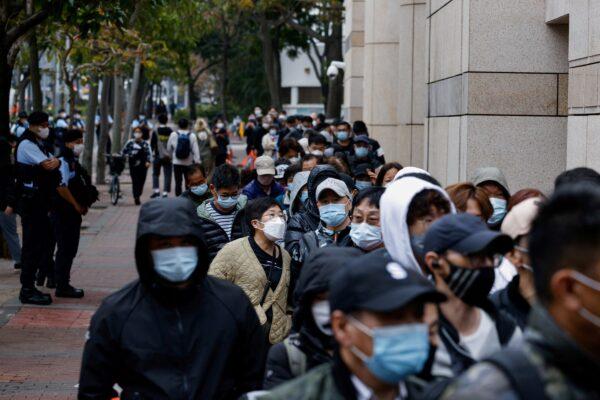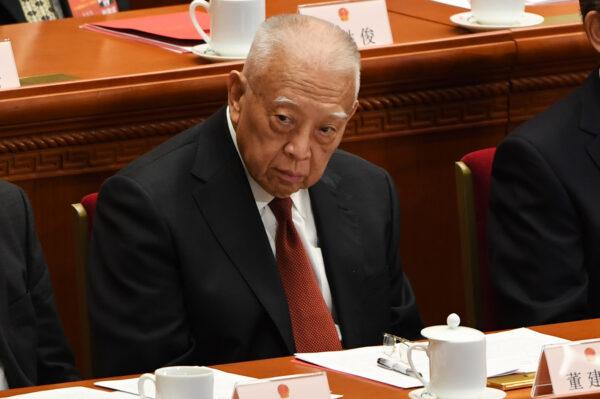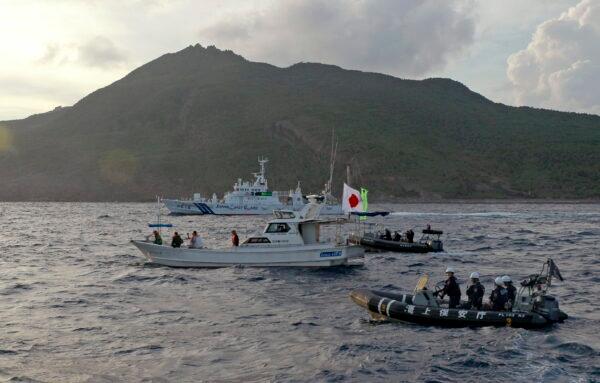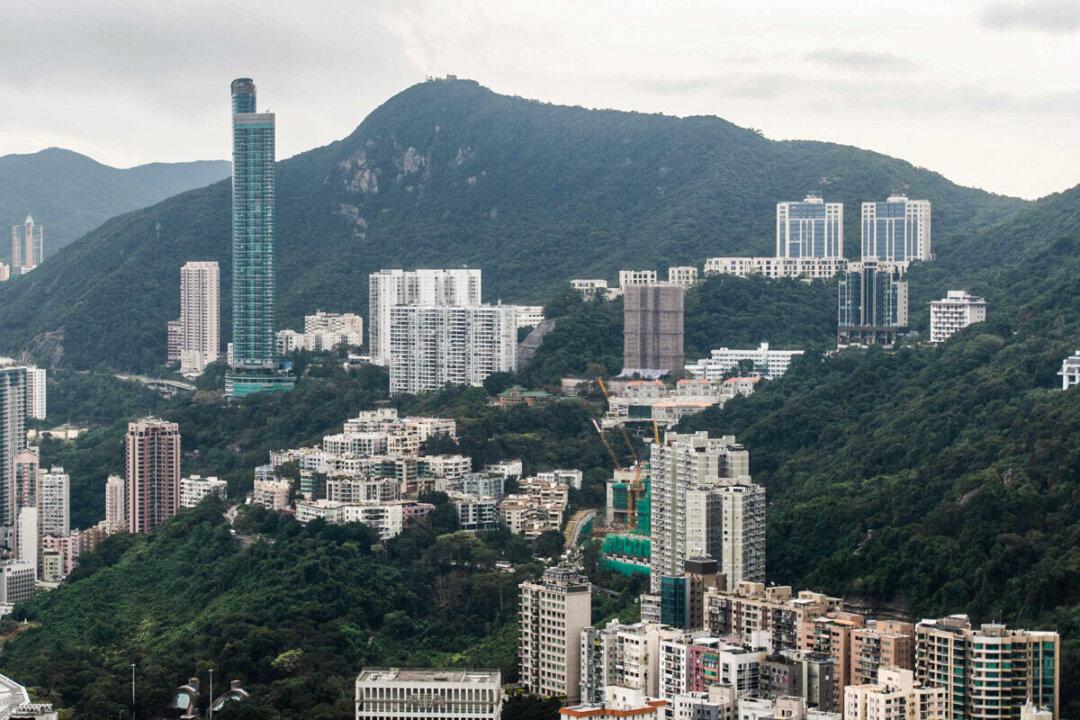The prospect of Basic Law Article 23, which rocked Hong Kong in 2003, is now becoming a reality under Beijing-controlled Hong Kong authorities.
“While the society as a whole looks calm and very safe, we still have to watch out for potential sabotage and undercurrents that try to create trouble, particularly some of the ‘independent Hong Kong’ ideas are still being embedded in some people’s minds,” John Lee Ka-chiu, Hong Kong’s chief executive, said at a press conference on Jan. 30.
Article 23, outlined in Hong Kong’s Basic Law enacted after its handover from British rule in 1997, mandated that Hong Kong write its own national security code. An attempt to do so in 2003 led to massive protests, leading the government to shelve the proposal.
After pro-democracy protests brought hundreds of thousands of Hongkongers to the streets in 2019, Beijing imposed a national security law to punish four major crimes: secession, subversion, terrorism, and collusion with foreign forces.
Now, under an administration hand-picked by the Chinese Communist Party (CCP), Hong Kong is once again looking to pass Article 23, which authorities say will fill loopholes left by the national security law. A four-week comment period will precede a vote on the law by Hong Kong’s Beijing-aligned legislature.
The new national security law will cover five offenses: treason, insurrection, theft of state secrets and espionage, destructive activities endangering national security, and external interference.
The newly added ordinance on “external interference” will prohibit any person from cooperating with foreign powers to interfere with Hong Kong’s elections, legislature, and judiciary.
To the question of “Why now?” Mr. Lee responded, “The threats to national security—they are real. We have experienced all these threats. We have suffered from them badly. We were all very heartbroken. We still remember the pain and the sorrow. We don’t want to go through that painful experience again.” The chief executive referred to foreign agents who “may still be active in Hong Kong.”
Explainer: What Is Article 23?
The Sino-British Joint Declaration in 1984 set out the conditions under which Hong Kong would be transferred to China control and for the city’s governance after the handover. The treaty guaranteed a high degree of autonomy for Hong Kong, enshrined in the Basic Law, a mini-constitution that was the blueprint for the “one country, two systems” arrangement.After the signing of the treaty, the CCP was eager to establish a legal framework for the resumption of its sovereignty over Hong Kong. Article 23 of the Basic Law was part of that legal framework, stipulating that Hong Kong must enact legislation on its own to prohibit seven types of acts that endanger national security, including “treason, secession, sedition, subversion against the Central People’s Government, or theft of state secrets.”
However, the mandated legislation has not been realized since the handover of Hong Kong’s sovereignty in 1997.
In 1985, the CCP’s rubber stamp legislature set up a 59-member “Hong Kong Basic Law Drafting Committee.” However, the first draft of the Basic Law was regarded as too vague and wide-ranging.
The drafting committee added the words “to legislate on its own” to the second draft so that the Hong Kong authorities could legislate only when it considered necessary.
The drafting of the relevant provisions coincided with the Tiananmen Square movement in 1989. To strengthen its control over the Asia financial hub, the CCP reintroduced the offense of subversion and added a provision concerning political organizations to the re-draft.
A Broader Scope than the National Security Law
Some may wonder why, since the national security law had already been imposed when Mr. Lee came to power as chief executive in 2022, he should be so eager to legislate Article 23.“One reason is that recently, the whole international society is targeting the Hong Kong national security law. Many Western countries are questioning Hong Kong’s human rights situation,” current affairs commentator Wang Anran told The Epoch Times.
Mr. Wang said he believes that, given the negative attention garnered by the national security law, Article 23 may be an alternative.
While the national security law was implemented in 2020, of the seven items to be covered under Article 23, it only covered two: secession and subversion of state power. Therefore the two laws are expected to work together.
It is expected that if the legislation on Article 23 is completed, the scope of its coverage will be wider than initially planned. For instance, its definition of state secrets will be broader and more in line with China’s vague laws on espionage and state secrets. The proposal for the law deemed Hong Kong’s current definition of state secrets to be “not broad enough.”

There are concerns that Article 23 will cause the business environment in Hong Kong to continue to deteriorate. The law would include economic matters in its definition of national security.
“If a business or organization has a certain connection with a foreign government, it may be arrested,” said Simon Ngai Man Young, a professor at the University of Hong Kong’s Faculty of Law. “On top of that, even if it is a business enterprise or a joint venture, the source of funds may have to be checked more carefully.”
Chung Kim-wah, deputy chief executive of Hong Kong’s Public Opinion Research Institute, argued that Hong Kong authorities are now expanding the scope of Article 23 to include soft counter-opposition, cybersecurity, and false information.
Was 2003’s Legislation Targeted at Falun Gong?
Sources familiar with top CCP officials have said that in 2003, when authorities pushed for Article 23, their intended target was Hong Kong’s Falun Gong community.Hong Kong’s first chief executive, Tung Chee-hwa, openly made negative comments about Falun Gong in 2001. The following year, Mr. Tung initiated the legislation to implement Article 23. The legislation of Article 23 at the time was seen as a political mission given to Mr. Tung by late CCP leader Jiang Zemin, who initiated the persecution of Falun Gong.

During the SARS outbreak in 2003—a time when Hong Kong’s economy was in the doldrums, coupled with the introduction of the consultation paper on Article 23 legislation—worries about the future and dissatisfaction with Mr. Tung reached an unprecedented high.
The law was set to be passed on July 9, 2003. As the date approached, the Civil Human Rights Front, a pro-democracy group, called for a protest. On July 1, over 500,000 people took to the streets to oppose Article 23 and to demand that Mr. Tung step down.
Consolidating Control: Reciprocal Enforcement
Article 23 is now on the fast track to legislation, but it remains to be seen whether it will be shelved again.Meanwhile, Hong Kong authorities have introduced a law that allows for the mutual recognition of judgments in civil and commercial cases between China and Hong Kong.
Despite the description of the law as “reciprocal,” the legislation is clearly aimed at the Hong Kong judiciary, said political commentator and Epoch Times contributor Ji Da.
CCP Eager to Re-control HK for Strategic Reasons
The Mainland Judgments ordinance, coupled with the CCP’s actions surrounding the legislation of Article 23, shows that the CCP is eager to regain control of Hong Kong in the face of the current tense international situation, Mr. Wang said.In the international arena, friction continues between China and Japan over the Senkaku Islands (called the Diaoyu Islands by China). In addition, conflicts may arise at any time in the Taiwan Strait and the South China Sea. Concerned that Hong Kong could be another source of unrest, the CCP is enacting Article 23 at this time as a strategic consideration, according to Mr. Wang.

“When Hong Kong experienced a major upheaval in 2019, the CCP was very worried about these unstable factors, especially when it recognized that Hong Kong has always been an anti-communist base linking the mainland and overseas. The CCP was taking precautions by launching Lee Ka-chiu, the police chief, as the chief executive,” he said.
Hong Kong authorities expect to complete Article 23 legislation before the legislative council adjourns in July. The short consultation period has led to public concern that the comment period is only a formality.
Public consultation on Article 23 will remain open until Feb. 28.







